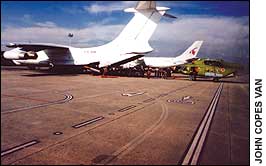 For a country that continues to pay the price of hasty compromises palmed off as historic change, the ongoing battle of wills may have some redeeming value. There are clear traces of relief in each combatant camp that a fight to the finish has finally begun. Consider some of our current contradictions. Nepalis face the awkwardness of having to accept the only party that has attempted regicide-twice-as the staunchest defender of the monarchy (OK, OK, they never targeted a titular head of state). The CPN-UML remains the fiercest opponent of a constituent assembly, the easiest route to the republic most of us believe it ultimately aspires for.
For a country that continues to pay the price of hasty compromises palmed off as historic change, the ongoing battle of wills may have some redeeming value. There are clear traces of relief in each combatant camp that a fight to the finish has finally begun. Consider some of our current contradictions. Nepalis face the awkwardness of having to accept the only party that has attempted regicide-twice-as the staunchest defender of the monarchy (OK, OK, they never targeted a titular head of state). The CPN-UML remains the fiercest opponent of a constituent assembly, the easiest route to the republic most of us believe it ultimately aspires for. The two parties wearing freedom in their full names-Rastriya Prajatantra Party and Nepali Congress (Democratic)-are fighting the hardest to ward off the regressive label. The Maoists, who have manipulated fissures in most mainstream parties all these years, are caught between their commitment to joint action to preserve the gains of 1990 and a perpetual readiness to hold talks with the real possessors of power. The palace finds itself being coerced to accept a purely ceremonial role by the same forces that have conferred on it the status of a political power centre.
These anomalies have been amplified in the post-9/11 ambience. The US-led war on terrorism, to be sure, has increased the importance of democracy in the armoury of idealism. On the battlefront, though, the commanders are forced to fight radicalism by forging closer ties with some of the same illiberal regimes that continue to breed it.
To Western eyes, the economics of extremism puts Nepal in the league of Georgia, the Philippines and Yemen. The conventional wisdom is that while poverty doesn't cause terrorism, it can lead to hopelessness and despair in states where governments fail to fulfil the basic needs of the people. Because of the realisation that such nations easily become havens for terror, "defensive imperialism" has ceased to be the oxymoron many of us thought it was.
Nepal also embodies the unfinished business of the Cold War. Those who dismissed the 'people's war' in its nascence as an ephemeral legacy of Cambodia and Peru still can't detect what's behind the diffusion. Left International is banking on Prachanda's Path to resume the march of history Francis Fukuyama so famously ended. History, however, comes with its own histrionics. Comrade Badal wasn't shooting from the hip when he described Nepal as a load of dynamite between two boulders. Civil war wasn't a purely internal affair even when national sovereignty was sacrosanct. With communist internationalism having been edged out by global capitalism, great powers are more apt to intervene in domestic conflicts to protect their international interests.
Our political discourse needs something more creative than the democracy-is-in-danger refrain. And more so, when the World Bank decides to lift our lending status from low to base case. The bank is categorical in its report card: "Over the past year or so, despite the continued political turmoil, the reform efforts-largely led by technocrats-seems to have gained momentum and resolve." Kangresis and comrades are correct in counselling a newly assertive palace not to read too much into the accolade. Where they err is in continuing to isolate Sher Bahadur Deuba and his teammates who presided over the "quiet governance revolution" the bank lauds. (For the record, Ram Sharan Mahat who as finance minister entertained donors with an improvised prance after last year's Nepal Development Forum, ditched Deuba the day after the premier dissolved parliament. How does he feel today?)
In a sense, Nepal has reverted to the months between Satra Sal, when parliament was abolished and political parties were outlawed, and Unnais Sal, when the panchayat system was formally enshrined in the constitution. Remember how the exiled Nepali Congress abruptly called off its insurrection on the prodding of its Indian hosts. The real catalyst, though, was Nepal's northern neighbour, which scored a decisive victory in the Sino-Indian war of 1962, changing the regional power equation.
Many who tend to ignore the geo-strategic core of Nepali politics do so because it's so perplexing. But these are shadowy times where every shade and snap has a meaning, and presents an opportunity.
A word of caution: In our righteousness race, let's be sure we really know where the finishing line is. We don't want to end up having to vote for a constituent assembly every three years, do we?


